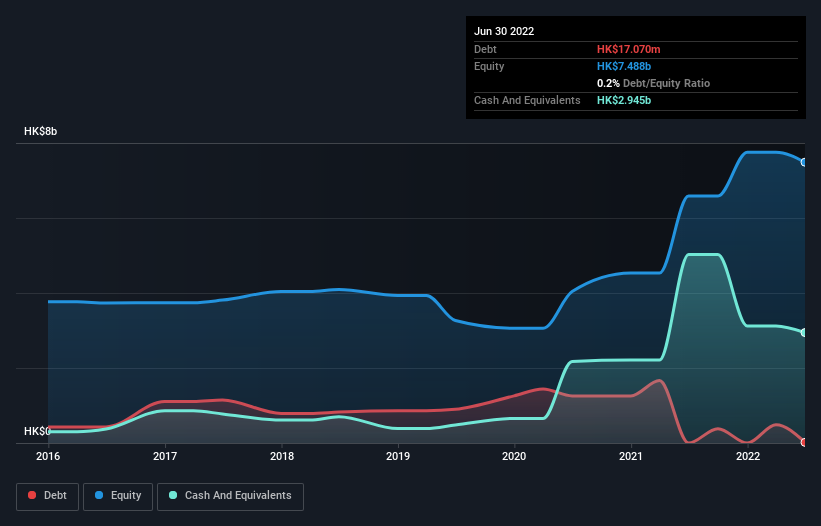Some say volatility, rather than debt, is the best way to think about risk as an investor, but Warren Buffett famously said that 'Volatility is far from synonymous with risk.' When we think about how risky a company is, we always like to look at its use of debt, since debt overload can lead to ruin. We can see that Viva China Holdings Limited (HKG:8032) does use debt in its business. But the more important question is: how much risk is that debt creating?
When Is Debt Dangerous?
Generally speaking, debt only becomes a real problem when a company can't easily pay it off, either by raising capital or with its own cash flow. If things get really bad, the lenders can take control of the business. However, a more common (but still painful) scenario is that it has to raise new equity capital at a low price, thus permanently diluting shareholders. Of course, debt can be an important tool in businesses, particularly capital heavy businesses. The first thing to do when considering how much debt a business uses is to look at its cash and debt together.
Check out our latest analysis for Viva China Holdings
How Much Debt Does Viva China Holdings Carry?
As you can see below, at the end of June 2022, Viva China Holdings had HK$17.1m of debt, up from none a year ago. Click the image for more detail. But it also has HK$2.95b in cash to offset that, meaning it has HK$2.93b net cash.

How Healthy Is Viva China Holdings' Balance Sheet?
The latest balance sheet data shows that Viva China Holdings had liabilities of HK$897.6m due within a year, and liabilities of HK$422.5m falling due after that. Offsetting this, it had HK$2.95b in cash and HK$166.7m in receivables that were due within 12 months. So it can boast HK$1.79b more liquid assets than total liabilities.
This excess liquidity suggests that Viva China Holdings is taking a careful approach to debt. Given it has easily adequate short term liquidity, we don't think it will have any issues with its lenders. Simply put, the fact that Viva China Holdings has more cash than debt is arguably a good indication that it can manage its debt safely. When analysing debt levels, the balance sheet is the obvious place to start. But it is Viva China Holdings's earnings that will influence how the balance sheet holds up in the future. So when considering debt, it's definitely worth looking at the earnings trend. Click here for an interactive snapshot.
Over 12 months, Viva China Holdings reported revenue of HK$1.4b, which is a gain of 5.6%, although it did not report any earnings before interest and tax. We usually like to see faster growth from unprofitable companies, but each to their own.
So How Risky Is Viva China Holdings?
While Viva China Holdings lost money on an earnings before interest and tax (EBIT) level, it actually booked a paper profit of HK$1.2b. So taking that on face value, and considering the cash, we don't think its very risky in the near term. With mediocre revenue growth in the last year, we're don't find the investment opportunity particularly compelling. There's no doubt that we learn most about debt from the balance sheet. But ultimately, every company can contain risks that exist outside of the balance sheet. To that end, you should learn about the 3 warning signs we've spotted with Viva China Holdings (including 1 which is concerning) .
When all is said and done, sometimes its easier to focus on companies that don't even need debt. Readers can access a list of growth stocks with zero net debt 100% free, right now.
New: Manage All Your Stock Portfolios in One Place
We've created the ultimate portfolio companion for stock investors, and it's free.
• Connect an unlimited number of Portfolios and see your total in one currency
• Be alerted to new Warning Signs or Risks via email or mobile
• Track the Fair Value of your stocks
Have feedback on this article? Concerned about the content? Get in touch with us directly. Alternatively, email editorial-team (at) simplywallst.com.
This article by Simply Wall St is general in nature. We provide commentary based on historical data and analyst forecasts only using an unbiased methodology and our articles are not intended to be financial advice. It does not constitute a recommendation to buy or sell any stock, and does not take account of your objectives, or your financial situation. We aim to bring you long-term focused analysis driven by fundamental data. Note that our analysis may not factor in the latest price-sensitive company announcements or qualitative material. Simply Wall St has no position in any stocks mentioned.
About SEHK:933
Viva Goods
An investment holding company, provides apparel and footwear in the United Kingdom, the Republic of Ireland, the United States, the People’s Republic of China, Asia, Europe, the Middle East, and Africa.
Excellent balance sheet and slightly overvalued.
Similar Companies
Market Insights
Community Narratives



